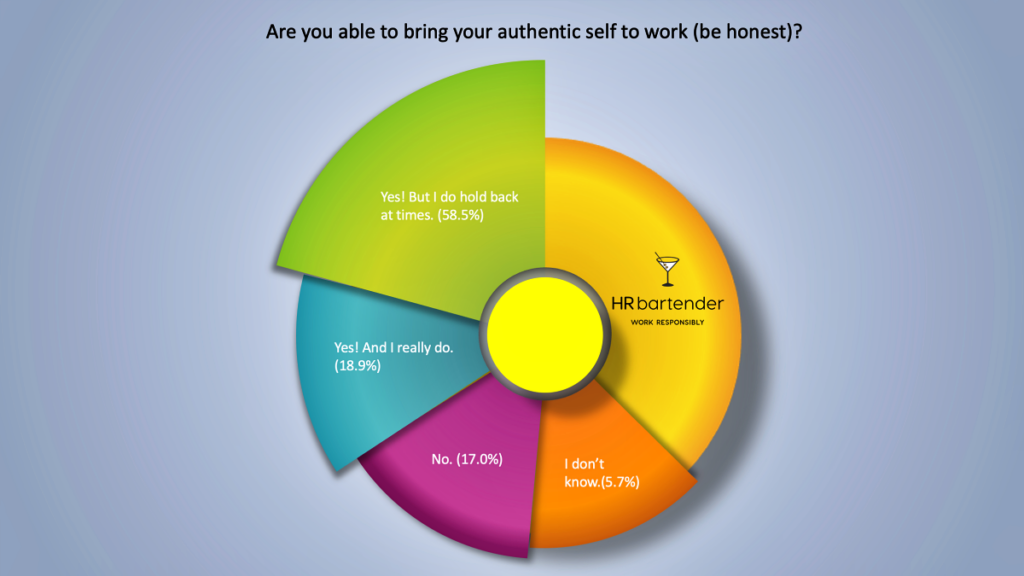Estimated reading time: 4 minutes
A few weeks ago, I asked you about authenticity. Specifically, whether you’re able to bring your authentic self to work. Here’s what you said:
I want to thank everyone who responded to this poll. It wasn’t an easy question. In fact, shortly after the poll launched, someone sent me a note saying, “Being authentic comes with a price.” It’s true. However, not being authentic also comes with a price. My question is, do employees know why they’re not being their authentic self at work? If so, then great! But if not, this could be an important self-awareness moment.
It could be imperative for organizations to understand authenticity as well. If companies are trying to create more inclusive work environments, understanding why employees might be holding back could be significant. Here are a few reasons that employees might hold back their authentic selves.
They want to fit in. Peer pressure is huge, even in corporate settings. Even if people hate them, the coffee gatherings and happy hours are opportunities to build relationships that might help someone in their career. Unfortunately, some groups don’t make it easy to accept “I’m tired and just want to decompress all by myself.” as a legit response to an invite. Employees need to feel a sense of balance between being themselves and being a part of the team.
They’re afraid of judgement or disapproval. Even if the organization doesn’t have get-togethers, there are times when fitting in includes being able to talk about the same things as everyone else. For example, an employee might fake their way through the conversations about March Madness games because the team will be talking about them – even though the employee didn’t watch them. And the employee might refrain from sharing that they snagged a shiny Mankey in Pokemon Go over the weekend because the team thinks it’s a kid’s game.
They don’t trust someone. Employees might not feel ready to open up to someone they don’t trust. This is where the conversation can impact building positive working relationships. For example, a coworker shares mean gossip or gives out false information. The employee then decides to keep their distance and only shares information on a “need-to-know basis”. This can also happen if a coworker offers some friendly advice like, “I wouldn’t trust that person if you know what I mean.” The employee might choose to hold back until they know differently.
They don’t want to have their feelings hurt. Mistakes happen all the time. Misunderstandings happen. Most of the time, employees talk those situations through, and they’re able to repair the relationship. But there are also times when the mistake or misunderstanding changes a relationship permanently. An employee might have a personal experience that makes them question how much sharing they want in the future. Or they might witness a very public fallout that changes their mind about sharing.
Organizations have to also think about whether they allow more authenticity from their high potential and high performers, versus everyone else. Does the top salesperson in the company get to be their authentic self more because of their contribution? Is that okay? And if they stop being the top salesperson, will the situation change?
Fast Company recently published an article on “3 reasons not to bring your authentic self to work”. It’s a good read, but it takes me back to the takeaway of the poll. Individuals need to understand why they are holding back authenticity and ask themselves, “How much am I holding back?” and “Am I comfortable with it?” And organizations should also be asking questions if their employees feel the need to hold back. Is that the type of workplace that supports the company culture? Would authentic employees make the workplace better?
Image captured by Sharlyn Lauby while exploring the streets of Anaheim, CA
The post Holding Back Authenticity? Employees Should Understand Why appeared first on hr bartender.




0 Commentaires